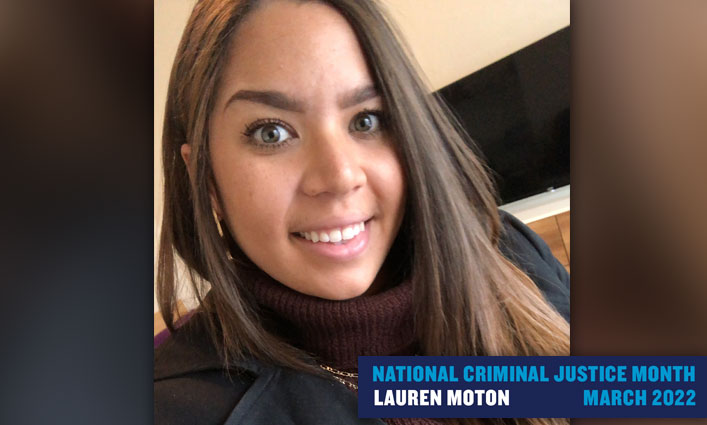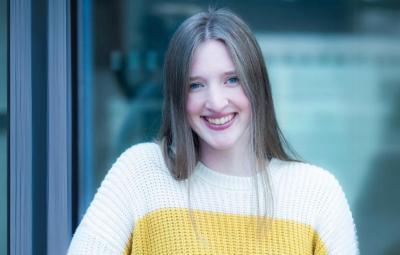
Lauren Moton’s ’23 doctoral research with Associate Professor Samantha Majic, Ph.D., and Research Professor Meredith Dank, Ph.D., focuses on better understanding the lives, concerns, and issues facing sex workers and survivors of human trafficking. “I want to provide a space for them to define what their experience is,” says Moton. “When policymakers are talking about sex work or human trafficking, the testimony of the people within that population should be at the forefront of the decisions. I hope that my research helps bring them and their experiences to the table.”
“When policymakers are talking about sex work or human trafficking, the testimony of the people within that population should be at the forefront of the decisions.” —Lauren Moton
Can you unpack the terms “sex work” and “human trafficking?” What are the myths, fallacies, and biases around these criminal legal terms?
There’s a lot to unpack. First of all, the crime of human trafficking is fairly new as defined within our federal legislation. The TVPA, or Trafficking Victims Protection Act, came to fruition in 2000. At its core, it is force, fraud, or coercion in either labor exploitation or sexual exploitation. So, there needs to be a third party involved in putting an individual into exploitative labor circumstances or sexual labor circumstances.
There’s a lot of debate around sex work. Some people believe that sex work can be a means of sexual liberation for a person who wants to explore their sexuality, their body, and autonomy, while also being financially compensated for it; but then there are others who believe that all sex work is some form of exploitation.
I’m not saying one thing is right or wrong. I’m not a sex worker myself. I’ve never been sexually exploited, so I’m not the one who should make that kind of determination. There’s a big range of experiences out there when it comes to those who are actively engaged in or have been previously engaged in the sex trade, and they should define their experience.
What drew you to this area of the criminal legal system?
I identify as a Black queer feminist, and a criminologist, so I occupy a lot of different spaces. I grew up in this little rural farm town in Ohio, and to be honest, I wasn’t seeing many people that looked like me. When I was getting my master’s degree, I was excited to take a feminist course and I was introduced to Black feminists’ work from women like Kimberlé Crenshaw, bell hooks, and Patricia Hill Collins. That inspired me to explore the intersection with the criminal legal system.
When I came to John Jay, I was interested in how women were being policed—particularly women of color and queer women. During my first year in the program, I was paired with Dr. Majic as her research assistant. I knew nothing about sex work or human trafficking at the time and she introduced me to this whole complicated world surrounding these issues. Dr. Majic is just such a strong feminist, researcher, and scholar, and I was in awe of her work. It felt like it was calling me, so I developed my project and I’m still feeling the passion of doing this research. These different populations that are impacted disproportionately by over policing, policy, and legislation deserve to have their voices incorporated in the decisions that affect their lives.
“Victimhood is the central theme within my dissertation, exploring the notion of victimhood within Human Trafficking Intervention Courts and diversion programs.” —Lauren Moton
What is your dissertation specifically focusing on?
Victimhood is the central theme within my dissertation, exploring the notion of victimhood within Human Trafficking Intervention Courts and diversion programs. I’m interested in understanding how this label of “victim” is being applied within these court contexts and how the defendants within those courts feel about that label. Do they agree with it? Do they push back against it? Does their understanding of the “victim” label align with the view of the court stakeholders? I did field work in the New York City Human Trafficking Intervention Court circuit and now I’m in Columbus, Ohio doing field work at their Human Trafficking Intervention Court. So, it’s a kind of a geographic comparative study as well.
“They’re the experts, not us. They’re creative and brilliant when it comes to knowing how to best serve the needs of their population.” —Lauren Moton
After six months of research so far, what have you found to be surprising, inspiring, or important for the public to know about this issue?
We really need to listen to these individuals who have had this unique experience. They’re the experts, not us. They’re creative and brilliant when it comes to knowing how to best serve the needs of their population. They have innovative ideas about how to implement resources. Some of the sex workers I’ve interviewed have talked about creating an area where sex workers could go without being policed and get medical care, mental health services, monetary assistance, food, clothing, and support. They’ve suggested that a space like this be run and staffed by other sex workers or former sex workers.
I think that that’s really cool because it provides a space where they feel safe and there isn’t a stigma because the people providing the care are like them. In a space like what they’ve envisioned, there would be a shared experience instead of help that may have been created under the guise of saviorism or paternalism, which in some cases have actually done more harm than good. It’s really cool to hear about it because they’ve already imagined all of the different aspects and benefits, but obviously they’d need support to turn their idea into a reality.



